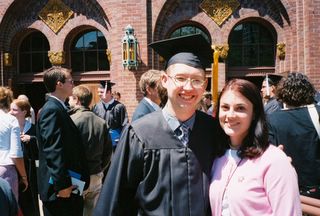Middle Knowledge
So in the last couple years, I've studied Molinism on a off-and-on basis. One of the difficulties that I've had in my study is that the most of the proponents of Molinism are top-notch philosophers (Bill Craig, JP Moreland, Alvin Plantinga, Thomas Flint) and so it's kinda hard to understand their writings. I need more concrete illustrations in order to get a grasp on such abstract concepts.
Basically Molinism holds that God's foreknowledge has three logical moments. Now it's important to realize that these aren't temporal moments. What we're talking about is "logical priority." As Craig writes, "To say that something is logically prior to something else is not to say that the one occurs before the other in time. Temporally, they could be simultaneous. Rather, logical priority means that something serves to explain something else. The one provides the grounds or basis for the other" (127).
Now before we examine these moments, it's important to remember that two of these moments take place logically before God decrees to create the world. The last moment takes place logically after God's decision to create the world. Let's take a look at each of these moments.
The first moment is called natural knowledge. This term refers to God's knowledge of all the logically possible worlds that He could create. God's natural knowledge includes His knowledge of all necessary truths. "God's natural knowledge includes knowledge of all possibilities. He knows all the possible individuals He could create, all the possible circumstances He could place them in, all their possible actions and reactions, and all the possible worlds or orders which He could create" (Craig 129).
For the time being, let's skip to the third moment in God's foreknowledge and then later we'll come back to the second moment. The third moment is called God's free knowledge. This refers to God's knowledge after His decision to create this world. This includes His foreknowledge of every event that has occurred on our world and has yet to occur. Since God didn't have to create this world, He didn't have to this knowledge. If He had decided to create a different world, the content of His free knowledge would have been different.
Now let's jump to the second moment in God's foreknowledge, which is called His middle knowledge. "In this moment God knows what every possible creature would do (not just could do) in any possible set of circumstances" (Craig 130). Thus, before His decision to create this world, He knew what I would do in any situation.
The Bible gives us a couple of illustrations of this in 1 Sam. 23. In 1 Sam. 23, David is being chased by King Saul. David is hiding in the small town of Keilah. Somehow Saul finds out about David's hiding place and heads toward Keilah. Learning of Saul's plot, David asks God an unusual question. David asks God if the elders of Keilah would turn him over to Saul if he should stay in Keilah. God answers yes. So David leaves before the elders get the chance to betray him. This passage shows us that God not only knew what actually happened in the situation, but God also knew what could have happened if the circumstances had been different. Another example can be found in Matt. 11:20-24.
This is an interesting doctrine that we need to consider when wrestling with the issue of God's foreknowledge.








